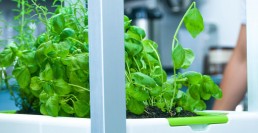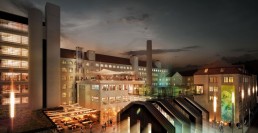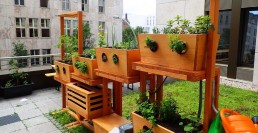greenYou: The innovative indoor greenhouse
Growing your own food in your garden is nice, but what if you don’t have a garden? German startup greenYou provides you with simple solutions to grow crops in your kitchen. Their products combine function and design in a smart and innovative way. We talked to Erik, managing partner of greenYou.

Q: Hi Erik, what is greenYou?
Erik: greenYou is a young startup, which develops smart indoor gardening solutions. We also see greenYou as a lifestyle brand for people who want to grow their own organic food at home, without compromising on design. This also applies to bars and restaurants that want to offer fresh, organic herbs for their meals and cocktails.
Q: Tell us a little bit about your company: How did you get started?
Erik: Sören and I got to know each other over the internet in 2016. He had started a small indoor greenhouse but could not produce it any longer. I liked the idea and with the help of a Norwegian product design company, that I have strong ties to, we were able to design our own greenhouse: the greenUnit 2.0. We started a rapid development process in May 2016 and had our first prototype in September 2016, at display at a fair. Looking back it was a really crazy timeline, but with a lot of passion and a strong partner we had the finished product in our warehouse in mid-May 2017.
“Just wait and let it grow”
Q: You have several products in your portfolio. Could you give us an overview?
Erik: Beside different organic seeds from mint to chili we also have the self-watering, smart pots to plant them. The greenPot has a water control function that reminds the user to refill water, so the plants do not faint. In addition to that, the greenPot Plus+ comes with a LED lighting. So you can grow herbs or other plants without direct sunlight. It also can be used as a reading lamp or desk lamp for efficient use of power, thus serving several purposes.
Last but not least, we have our bigger greenUnit 2.0. It contains our newly developed Sunlight LED Technology, and of course also an automatic watering solution.
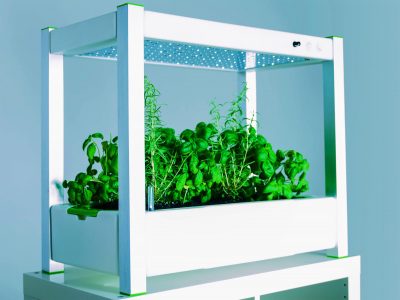 With this innovative indoor greenhouse we are targeting indoor gardeners, who want to grow their organic herbs and vegetables throughout the year. It is also a great learning aid for schools and kindergartens to grow plants with the children in the classroom. Due to its automatic watering solution and minimal maintenance effort, it also suits very well into offices and reception desks. Another key market is bars and restaurants that want to serve their guests homegrown organic herbs. The mint for a cocktail can be harvested directly in front of the guest. Our feedback is, that customers love it and bar owners improve sales.
With this innovative indoor greenhouse we are targeting indoor gardeners, who want to grow their organic herbs and vegetables throughout the year. It is also a great learning aid for schools and kindergartens to grow plants with the children in the classroom. Due to its automatic watering solution and minimal maintenance effort, it also suits very well into offices and reception desks. Another key market is bars and restaurants that want to serve their guests homegrown organic herbs. The mint for a cocktail can be harvested directly in front of the guest. Our feedback is, that customers love it and bar owners improve sales.
Q: What do your customers have to do when they want to grow crops with your systems?
Erik: That’s the nice and easy thing with our system: You just have to fill in soil or an alternative substitute, plant the organic seeds (we always deliver our products with seeds) and fill water in the tank. Then just wait and let it grow!
Q: You don’t need any fertilizer?
Erik: The fertilizer is in the soil, but of course the plants use it up by time after some replanting. We are working on a cooperation with a company specializing on microorganisms which produce fertilizer in the soil for more than one year – totally organic, no chemicals! We want to offer a solution with microorganisms, if possible within this year if tests go well – it looks promising so far.
Q: What makes the greenUnit and the greenPot special compared to similar products?
Erik: During development we have focused on functionality, design and quality. I think that we have set a new standard with the greenUnit 2.0 and the new Sunlight LED Technology. All of our products have a straight and honest design and fit into bars, restaurants, offices and homes with their simple, modern look.
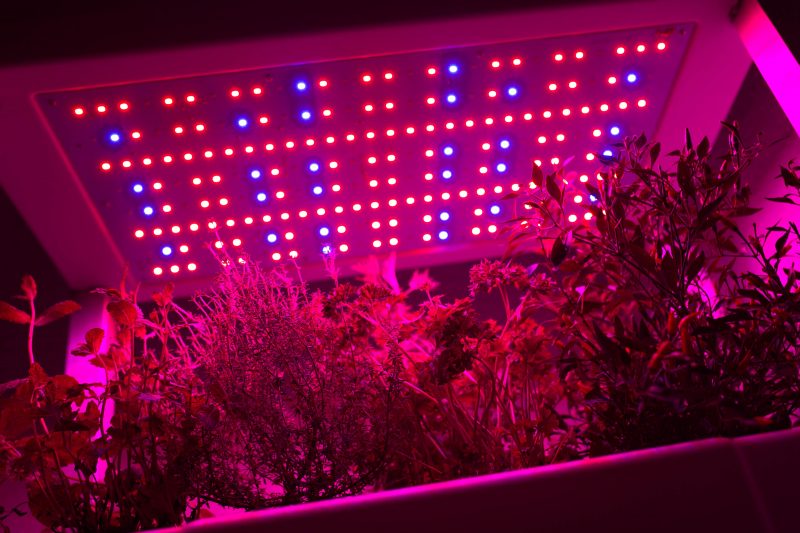 Q: You mentioned your SUNLIGHT LED TECHNOLOGY. What are its effects on plant growth?
Q: You mentioned your SUNLIGHT LED TECHNOLOGY. What are its effects on plant growth?
Erik: Our goal was to develop an artificial and energy-efficient grow light solution. Having said that, we soon knew that we have to work on a lighting solution which doesn’t require active cooling.
Research and tests showed which color temperature and spectrum has the most impact on the growth of plants. There are many different factors that influence the growing process of plants, but the perfect lighting is among the most important ones.
“Homegrown food will always taste best”
Q: What have been your biggest technical challenges so far and how did you manage to overcome them?
Erik: There were many challenges during the development process of our new greenUnit 2.0. Starting with the specification and testing of our Sunlight LED Technology to different production methods of the other parts to make them look nice and fit perfectly. Thankfully, there are techniques like 3D printing nowadays, speeding up the development process.
Q: How do you think the Indoor Farming market will develop within the next couple of years?
Erik: There are two trends we discovered: One is to go back to organic food and grow your own food at home. With our indoor garden, you can grow crops, sprouts and herbs throughout the whole year inside your own flat. The second trend is to optimize the grow process of plants with the help of artificial light and computer-aided watering and nutrition supply.
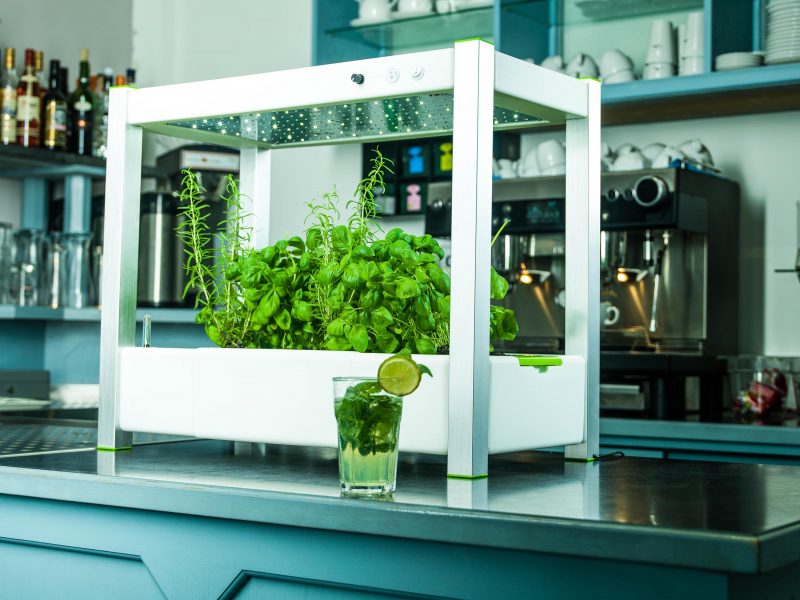
Q: And where will greenYou be in 10 years? What is your vision?
Erik: Ten years is a very long time. It’s difficult to predict the future of indoor gardening, but I think we will have to be creative and efficient to feed all humans on the planet in future. As the horizontal space is limited, vertical gardens are getting more attention. There could be a big positive climate effect in the cities if house facades would be used to grow plants. The air would be cleansed by the plants and if we would grow food in the cities we wouldn’t need all the trucks driving to the stores to supply them with vegetables and fruits.
Industry 4.0 is affecting all areas of our life. With the help of sensors and big data we try to optimize every process around us. People even try to optimize themselves with smart tracking devices and apps where nutrition and sport is tracked. In ten years every single ingredient of a menu in a restaurant will be traceable back to all the suppliers and all the nutritions in it will be available with a simple photo, taken by the mobile phone or NFC like technology in the food.
But food growing and production will always be relevant, midst in a world of digitalization and technology – and homegrown food will always taste best!
Wanna know more? greenYou will appear in a TV feature on German station NDR on Friday Sept 22 at 8:15 PM CEST.
All pictures (c) by greenYou
LIVE AT STUTTGART - The place we grow our company and crops
As you might know from our very first blog post, farmee has modest goals like reinventing urban food production and solving the future food crisis. We will do so by simplifying smart farming, effectively building an accessible open software and hardware platform to manage and control your farm and crops.
As an early stage startup, we still have to figure out a lot to achieve our goals. And we know, of course, that we have a long way to go. What is already set though, is where we will be while figuring things out. And we’re always open for visitors, in case you’re interested what we’re doing around here.
Growing, together
The old factory building of Leitz, a famous german office supplies company, is located in Stuttgart-Feuerbach. It is currently a huge construction site, since production moved away some years ago. Today, the old building is set to become one of Europe’s biggest Innovation Campuses.
On 36,000 square meters, our friends at LIVE AT WORK are developing their vision of the future of work: shared offices, startup and company spaces, a machine park and a maker’s market place, fitness club, a restaurant, bistros as well as a rooftop terrace to meet, work and enjoy everything LIVE AT STUTTGART – the projects name – has to offer.
A project of this magnitude isn’t done over night and we are more than grateful that farmee is a part of this story from the very beginning, peacefully co-existing on the construction site. While the construction workers are busy getting the other areas ready for new tenants, we have found our base on the seventh floor, together with the corporate startup platform Pioniergeist, their residential startup teams and the startup studio hatchery.
Isn’t that the perfect surrounding to invent the future of farming?
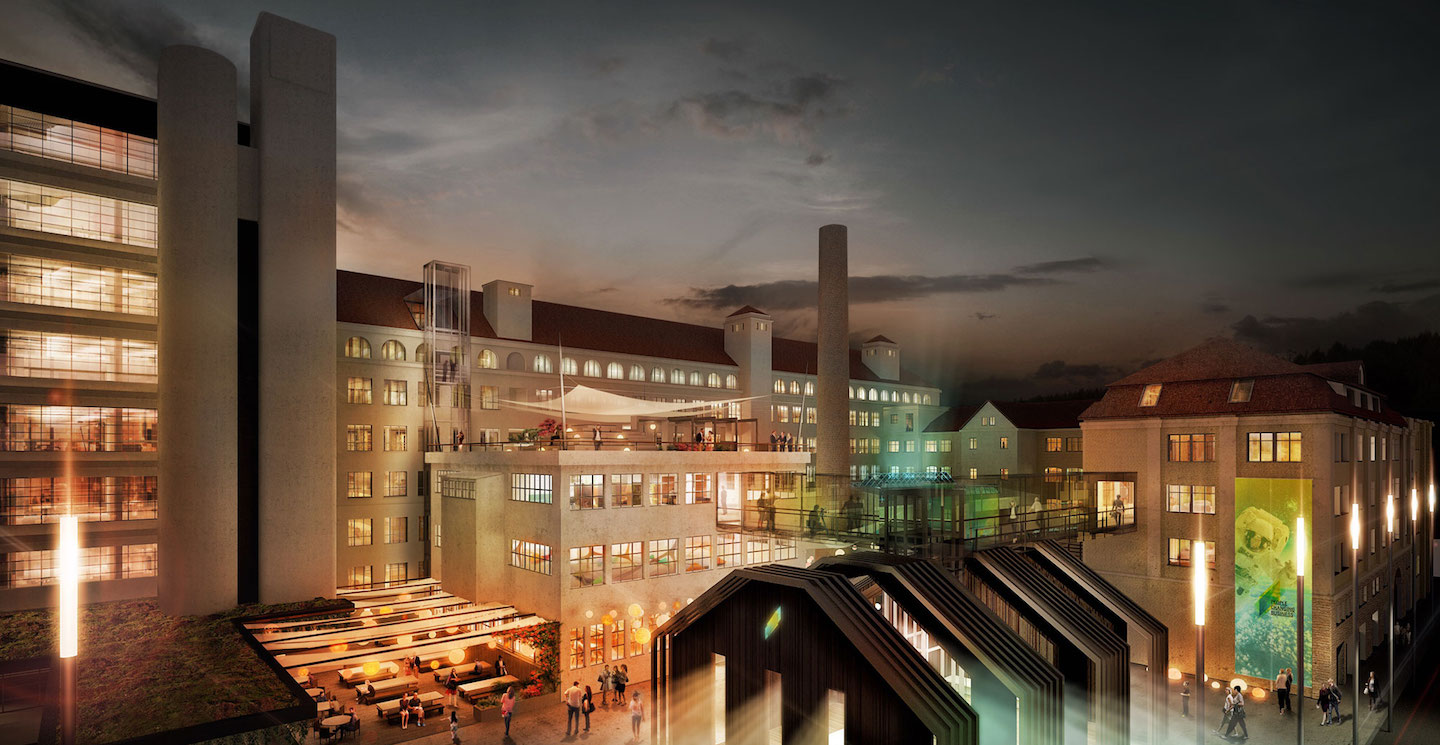
Why is farmee and LIVE AT STUTTGART such a good fit?
A cornerstone of the LIVE AT STUTTGART concept is the close proximity of all tenants on campus and the synergetic opportunities generated, when working together and repeatedly meeting in the community areas.
A basic idea is to create value cycles within the campus, where startups, corporates and artists not only become co-workers, but also inspiring customers or partners in crime.
With farmee, we want to be the first startup to fully embrace this spirit by not only working at the premises, but also becoming a supplier for the campuses restaurant. We already have two prototype racks here, which are currently our base for development purposes, but we’ll make that lab a permanent institution – and always open for anyone interested. Last but not least, we’ll try to install a fancy showroom on-site, suitable for educational purposes and events of any kind.
Today, as you can see in the image below, our base is a bit less glittery, but has all the magic of a fresh start in an inspiring environment!
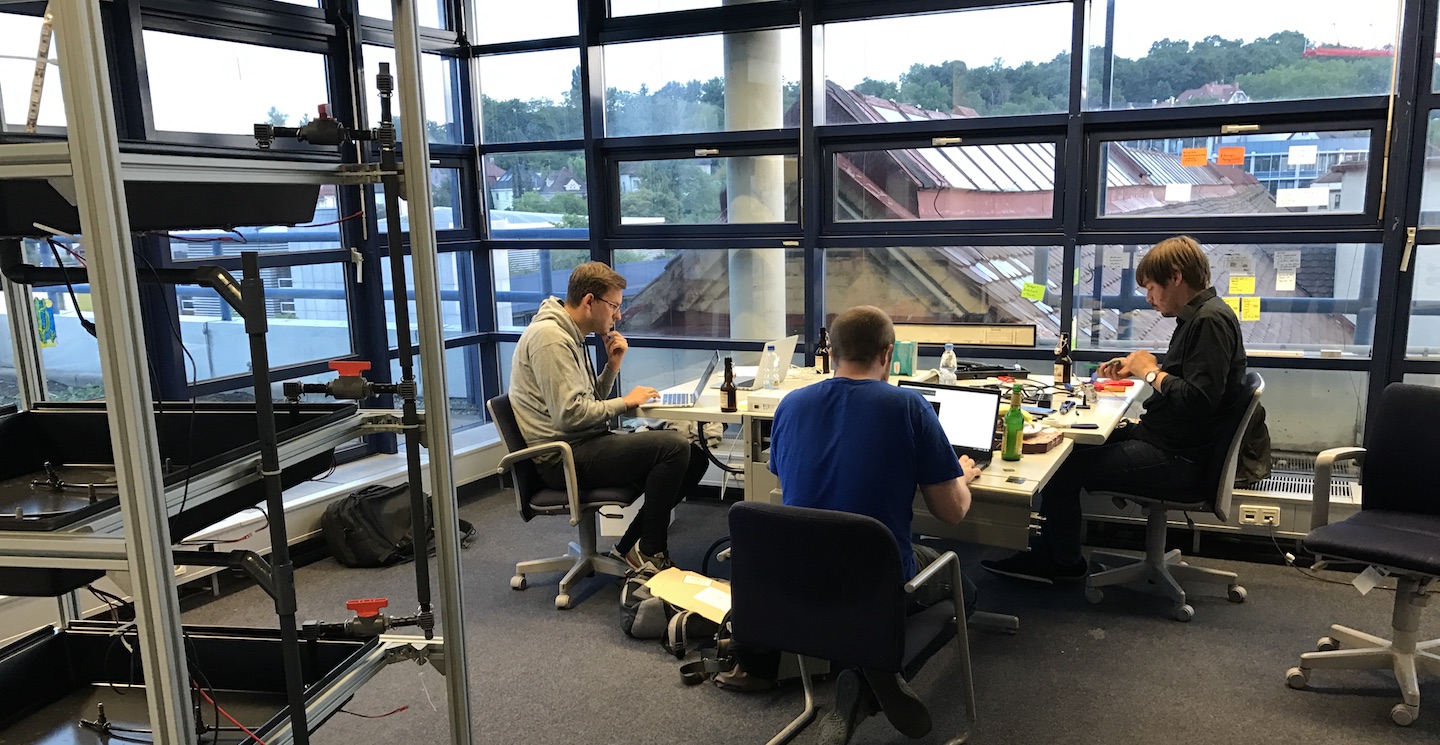
To sum it up:
- You can visit us anytime, just give us a shout beforehand, so we can safely guide you through the construction site
- If you do so, you can see two working prototype racks in our lab as well as witness the birth of our operating system farmee.OS
- We have great plans for farmee and LIVE AT STUTTGART, e.g. using the community area to create a showroom and other knowledge touch points to get the idea of open smart farming out there
- We’re planning a cooperation with the on-site restauraunt to produce and deliver food that is truly homegrown..
Join us in the forum and tell us your ideas about this place!
Geco-Gardens: „As simple as Farmville – with real crops“
How Geco-Gardens enables you to grow your own food on your balcony
Hello, farmees out there! On the farmee blog, we also want to present other companies from the field of smart or urban farming. We start this series with a really cool startup from Germany called Geco-Gardens. Founder Bastian Winkler took some time for us to talk about his amazing product.
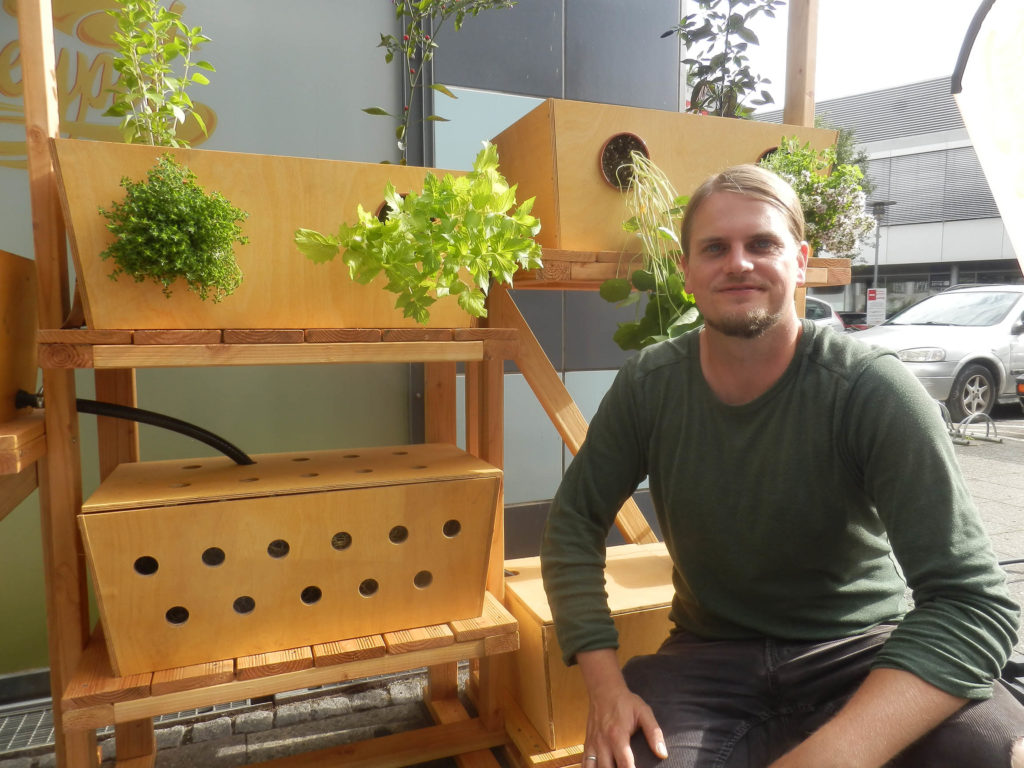
Q: Hi Bastian, tell us a little bit about Geco-Gardens. What are you doing?
Bastian: We are planning and constructing vertical, automated microgardening systems. With Geco-Gardens, people can grow their own organic vegetables, fruits, herbs and ornamental plants right in the middle of the city. This creates new gardening areas in front of your door, e.g. on balconies, patios, courtyards and rooftops.
The system consists of several planting containers, a vermicompost and a water tank. With energy from a solar panel, the water is pumped to the top and flows through all planting containers and the compost back into the water tank at the bottom. You put your organic kitchen waste into the compost box, where the compost worms transform it to a 100% natural fertilizer. These nutrients are washed out into the water tank, from where the water and nutrient cycle starts.
Q: Sounds awesome. How did you come up with the idea to develop your system?
Bastian: Currently I am doing research for my Ph.D. thesis at the University of Hohenheim (Southern Germany). It is about the introduction of renewable energy into smallholder agricultural systems in the emerging countries South Africa, India and Brazil. Aim is the creation of locally appropriate, integrated food and energy systems for the production of healthy food and renewable energy in an ecological and resource efficient way. To achieve that, the prodcution systems are based on locally available natural resources and on closed production and matter cycles.
During a research stay in South Africa, I got to know Luke Boshier, one of the pioneers in the field of integrated agricultural systems. Together we built a terrace cultivation system for an integrated ecological production of fish, rice and vegetables. Facinated by this resource-efficient way of production, which is independent of agricultural land, I adapted it for urban farming.
The fish were replaced by compost worms and the fish food by organic kitchen waste. The innovative, natural method called „terrabioponics“ was born. In Geco-Gardens the plants grow in soil (terra) and an organic nutrient solution (ponic). The nutrients are recovered in a natural process through worm composting of your own kitchen waste (bio).
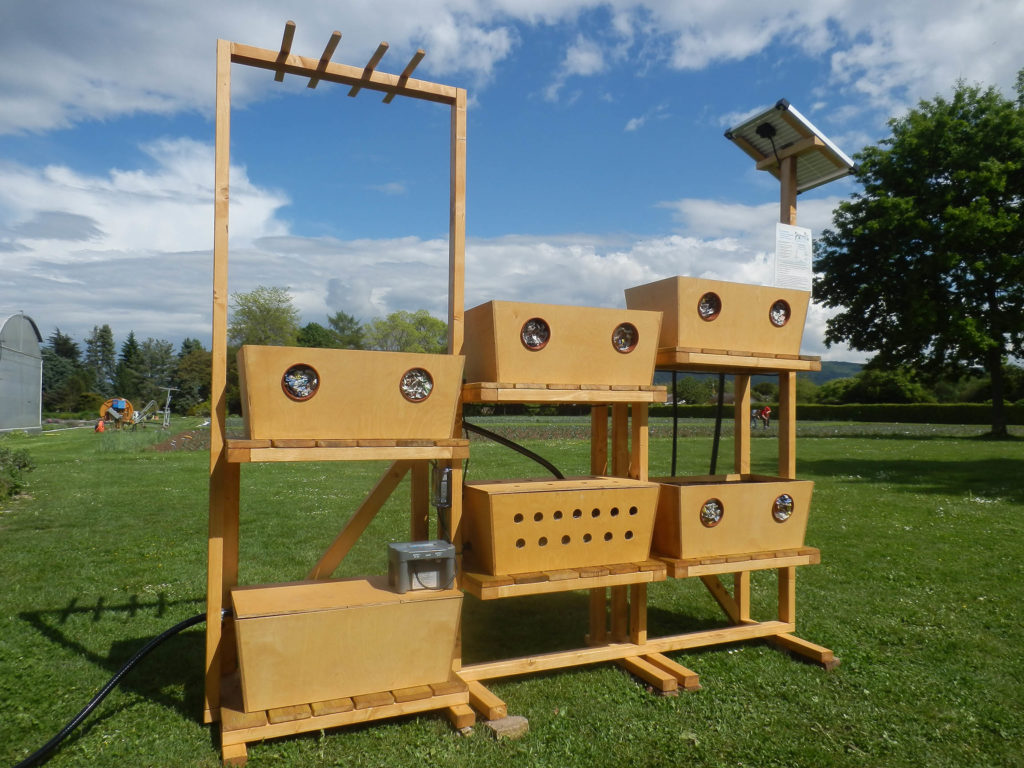
Q: What is special about your system compared to others?
Bastian: As a result of producing your own food right in the city, Geco-Garden systems create a direct connection between humans and nature. We combine the following topics in a unique way: direct waste recycling, natural matter cycles, renewable energy, modern technologies and ecological cultivation methods:
- You use our own organic kitchen waste for growing agricultural and ornamental plants
- Gardening made simple: No need for manual watering, thanks to the automated watering and nutrition circuit, which also fertilizes the plants
- You decide, what and how you grow: The decentralized food production reduces the transport of food in cities, thus saves energy and greenhouse gas emissions
- Collaborative gardening promotes social interaction and allows you to share your harvest with others, which creates rich crop diversity.
Consumers become producers
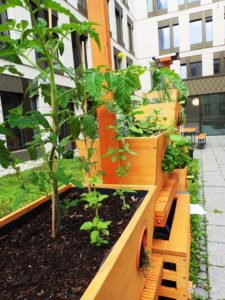
Q: Who are your typical customers and what are their most common crops grown with the system?
Bastian: Most customers of Geco-Gardens are private people e.g. young families living in urban areas. They want to have their own little garden for a healthier lifestyle and a closer connection to nature or show their kids how organic food is produced. We even have pensioners as customers. They appreciate the automated and thus convenient way of gardening without having to bend down.
Besides private people, our garden systems are very interesting for companies and other organizations that want to show their green engagement. A third customer segment are kindergartens and schools, to teach kids natural food production cycles from an early age.
You can grow any kind of vegetables, herbs and fruits in your garden system- The selection depends on your choice and the location of the garden system – the more sunlight, the larger the selection of crops. Typically our customers grow different herbs like basil, oregano, thyme, rosemary and mint, a variety of lettuces and other leafy greens as well as vegetables like tomatoes, cucumbers, peppers and chilies. At warm locations even melons will fruit!
Q: How much effort do your customers have to put in for growing their crops?
Bastian: The effort is very low: Sowing or planting with little watering in the beginning; feeding the compost worms and fill up the water tank once a week; harvest and consume. Furthermore, the pressure from pests and deseases is much lower in the city. Usually, there are no snails on a balcony 😉
Q: What is your long-term vision?
Bastian: The vision of Geco-Gardens is to create new gardening areas in cities for organic self-production of food. The reasonable use of modern technology in combination with ecological cultivation methods and the use of your own hands can transform urban resources directly into tasty food – diverse, local and organic. With Geco-Gardens, consumers become producers. Food production becomes decentralized, seasonal, regional, divers and therefore more sustainable.
Q: And what are your next steps?
Bastian: We want to bring our systems and our company to the next level. Therefore we cooperate with the software startup farmee (yay!) and entrepreneurship expert Dr. Christoph Mandl of ‘Zugspitze Ventures’ – together we form a team for the KATANA accelerator programme, which is funded by the European Union.
We will add a sensor based app to our existing system, so you can monitor your plants with your smartphone. This will automize the system even more, because you can control the water and nutrient cycle from anywhere, e.g. from the office or when you are on holidays. In addition, the app will provide an interactive guidance from sowing to harvesting. Growing healthy food on your own balcony will become as simple as playing Farmville on Facebook – but with real crops!
Watch out for our crowdfunding campaign coming in fall 2017! It would be awesome to get some support from the community so we can improve our product and enable more people around the world to grow their own organic food.
All pictures (c) by Geco-Gardens

